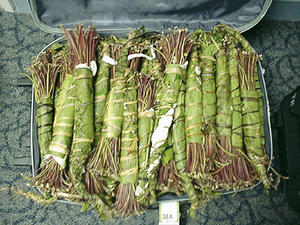TerrorismQuestions over Texas police linking chewable African plant to terrorism
Khat is a chewable African plant containing two active chemical substances — cathinone and cathine – which have a narcotic effect. Chewing the plant is common among men in the Horn of Africa and Yemen. The chemicals are banned in the United States, although the plant itself is not. Texas law-enforcement arrested several Muslim immigrants after a lengthy investigation found they were growing and selling khat. The police portrayed those arrested as supporters of terrorism, and suggested that the profits from the sale of khat to Muslims in the Houston area was sent abroad to support terrorist groups such as al-Shabaab. Civil rights advocates say that in this case, over-eager police and prosecution have confused traditional practice with support for terrorism.

Bundles of khat wrapped in banana leaves smuggled in a suitcase // Source: justice.gov
Law enforcement officials in Texas came to suspect that revenue from sales of khat, a chewable African plant, may be used to fund Africa-linked-terrorist groups. Investigators have quietly launched a lengthy investigation in Houston, and have arrested several people and seized 1,000 pounds of khat.
The Austin American-Statesman reports that the investigation was initiated when a Texas Department of Public Safety (DPS) trooper stopped two men during a routine traffic stop. The men were chewing green leaves which prompted a search of the vehicle, leading to an investigation that involves local, state, and federal law enforcement agencies.
Muslim civil rights groups are concerned that the DPS has unfairly portrayed the defendants as terrorists. DPS has included khat on a statewide threat assessment, although khat plant itself is not illegal. The active chemical substances in the plant, cathinone and cathine, are banned. Unlike other drugs found in plants like marijuana or opium poppies, the active ingredients in khat loses potency and can completely disappear in a few days.
Khat is native to the Horn of Africa, which may have led Texas state investigators to assume plant sales are benefitting terrorists groups like al-Shabaab, which oprates in Somalia. No evidence has been offered, however, to substantiate the accusation.
A Texas DPS threat overview labels khat as a “chewable narcotic plant grown in the Horn of Africa whose sale abroad is suspected to benefit Africa-based terrorist organizations such as al-Shabaab.” The assessment is based on a decade-old congressional testimony by then-FBI-assistant director, now DPS director, Steven McCraw. McCraw said it was likely that revenue from khat “pass through the hands of suspected (Islamic militants) and other persons with possible ties to terrorist groups.”
The American-Statesman notes that none of the arrests relating to khat sales or possession was made on terrorism-related charges. Andrew Ames of DPS’s National Security Division notes that past arrests have included money laundering charges due to transfers “to Somalia or other countries where khat originates from.” The prosecution did not offer details about the causes to which the revenues from the khat sales were directed.
According to Abilene Reporter-News, Mark Correro, defense attorney for the two men arrested for khat possession, claimed the prosecutor asserted his clients are terrorists. “Almost the very first words out of his mouth were, ‘You know your clients are terrorists, right?’”
The defendants are Ethiopian immigrants who work as cab drivers and in construction. Mustafaa Carroll, executive director of the Council on American-Islamic Relations - Texas branch, is concerned with the reference to terrorism that accompanies khat cases. “Initial vague references to terrorism usually don’t pan out in court,” said Ibrahim Hooper, national spokesman for the Council on American-Islamic Relations (CAIR). “But the damage is done to Muslims.”
